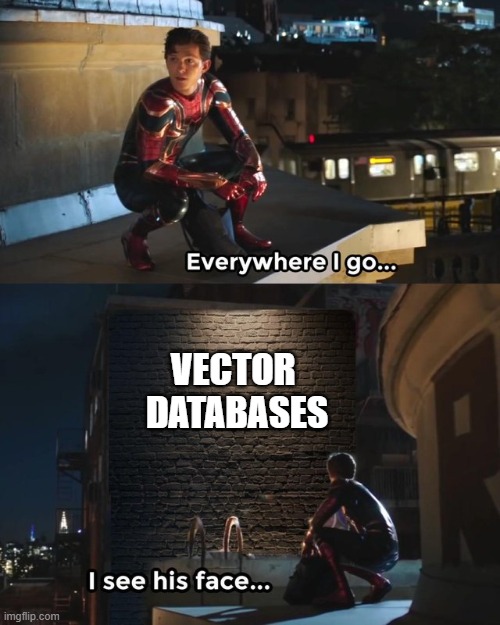Do you really need a Vector Database?
Do You Really Need a VectorDB?
Everywhere I go, I see his face – “VectorDBs”. Seriously, with the rise of GenAI and the growing number of applications utilizing Large Language Models (LLMs), Vector Databases have been posited as a de facto component in any LLM-powered application architecture. You might wonder why. The answer is seemingly straightforward: “LLMs have a limited context window, and to select the most relevant data, a VectorDB is necessary.” This seems logical at first, but let’s think more about it and consider the alternatives.
 Spiderman meme of seeing vector databases everywhere
Spiderman meme of seeing vector databases everywhere
1. Why Vector Search over Keyword Search?
Although Vector Search is popular for its ability to deliver semantically similar results, something Keyword Search can’t do, it’s not without its drawbacks. Keyword search is more accurate, faster, and can scale with new data more effectively.
Keyword search excels in finding exact matches and can be easily updated with synonyms and taxonomies. In contrast, Vector search requires a vectorizer (embedding model) to process every query, which can incur additional costs and latency. It’s also susceptible to data drift, as the embedding model might become outdated, missing new terminology and relationships.
In essence, keyword search is more interpretable, cost-effective, and often provides better performance.
2. Why Vector Database over a Vector Index?
If you still think Vector Search is more suitable for your case, consider using a Vector Index like Facebook’s “FAISS,” which supports the most popular indexing algorithms like “HNSW” and various similarity measures such as “L2 distance”, “dot products”, and cosine similarity. It can also handle indices that don’t fit in-memory.
3. Why Vector Database over a General-Purpose Database?
Databases like PostgreSQL, with its pgvector extension, and Elasticsearch, with dense vector indexing, support vector storage, indexing, and similarity search capabilities, along with traditional database benefits like ACID compliance, point-in-time recovery, joins, etc.
But,
Vector Databases definitely have their specialized use cases, especially for users managing billions of data embeddings. They benefit from architecture decisions that can improve performance over general-purpose databases, ensuring efficient storage of vectors and fast retrieval for similarity search calculations, while offering data safety. However, they aren’t the universal solution they’re often portrayed as.
Further Readings:
- Beware Tunnel Vision in AI Retrieval - by Colin Harman
- Do you actually need a vector database? - Ethan Rosenthal
#vectordbs #llms #genai #ir